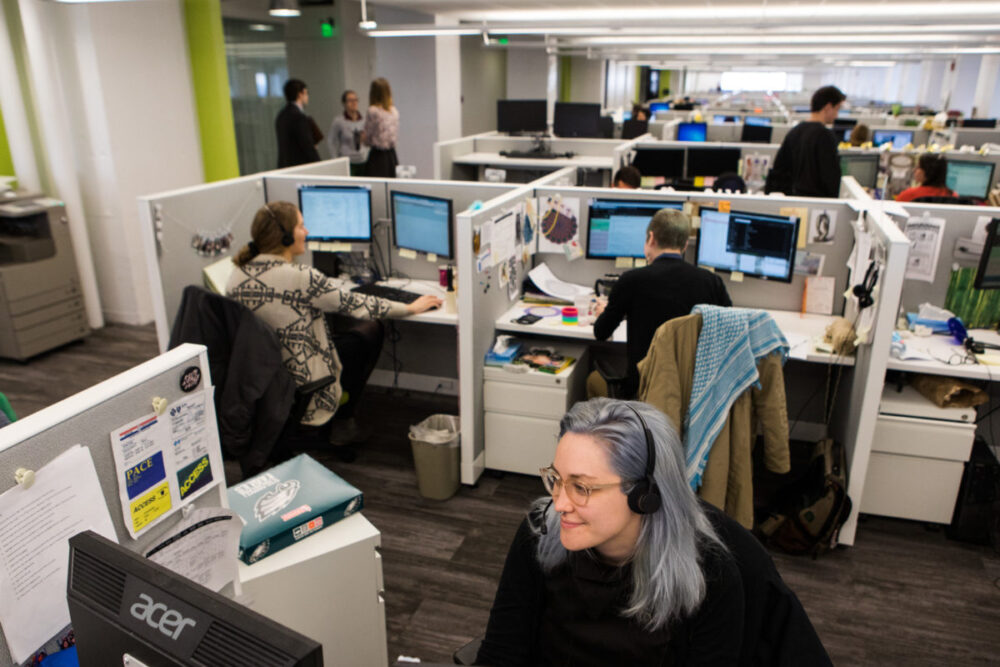
This is How I Got Here, a series where we chart the career journeys of technologists. Want to tell your story? Get in touch.
If you’re a person who hasn’t struggled with access to internet or computers, it can be easy to forget that a double-digit percentage of Philadelphians still lack such resources. Yet the digital equity community in Philly is filled with organizations and leaders trying to ensure all city residents have access to devices, affordable internet and the skills needed to use these tools.
East Kensington’s Kate Rivera has been a leader in Philly’s digital equity community for a decade, including currently as the executive director of the Technology Learning Collaborative (TLC), a professional development-focused nonprofit that convenes digital literacy providers and advocates.
But before that, with an undergrad degree in creative writing, she thought she would work in publishing right out of school. She struggled to find a job in that field, and instead spent a few years working in the mortgage industry — and couldn’t help but notice all the problems with the systems she was working in, such as mortgage brokers who cared more about their commission than giving good loans to people.
“I felt like I couldn’t really do anything about it, that I was just kind of part of a broken system,” she told Technical.ly. She decided to make a career change, and pivoted to nonprofit work: “I wanted to feel like I was going to work every day working towards fixing some of these problems or just working towards a better future.”
Entering the nonprofit sector
Rivera’s first experience in the nonprofit world was as an executive assistant at a small organization. She said that job gave her a solid introduction to what working for nonprofits was like, but she was frustrated that she wasn’t making a lot of money. She wanted to find a way to continue doing mission-driven work while earning more. Generally, nonprofit work has a reputation of not paying its workers enough, and according to a 2016 report from the Bureau of Labor Statistics, “management, professional and related workers” in the nonprofit field are at a wage disadvantage.
Before looking for another nonprofit job, Rivera decided to go back to school and earn an MBA with the intention of returning to the nonprofit sector after graduating. After earning her MBA from Drexel University, Rivera began working for the Urban Affairs Coalition (UAC) as project director for the Keyspots Initiative, a project through which UAC partnered with other organizations in the city to create more locations for Philadelphians to have access to devices, the internet and opportunities to learn computer skills. Rivera said this position first introduced her to the digital equity and inclusion space, and also showed her what working across sectors was like.
When Rivera first applied to this position, digital equity wasn’t a a topic she knew much about, she said. At the time — in the early 2010s — digital equity wasn’t a topic on a lot of people’s radars.
“Once I learned more about it and started working in the field, I realized how much digital equity touches on every part of our lives.”Kate Rivera
“Once I learned more about it and started working in the field, I realized how much digital equity touches on every part of our lives and what a fundamental issue it is and how much focusing on that can be a real game changer and leverage point for solving a lot of other issues,” she said. “And so it’s something that I’ve been passionate about ever since, for over a decade now.”
Keyspots was funded by the federal Broadband Technology Opportunity Program, and when funding was approaching its end, some of the involved organizations looked for a way to continue working together. The result was TLC. While Rivera said she wasn’t one of the leaders who started TLC, she followed their work and stayed engaged with the organization over the years. When TLC leadership decided they wanted to shift from a completely volunteer-run organization to a nonprofit, Rivera was a consultant to help make that change.
“As I worked with the organization, I got really invested in the idea of helping to build the organization and the importance of having a independent nonprofit 100% focused on digital equity in Philadelphia, which really didn’t exist up to that point,” Rivera said.
She continued to work with the org’s leadership on ways to expand and find more funding, and eventually, the board of directors asked her to join TLC part time as the executive director.
Finding meaningful work
It’s an exciting time for the digital equity field, per Rivera.
“There’s another big infusion of federal funding coming and so probably be doing a lot of work in digital equity for the next few years and really excited to see the change that we’re able to create with this historic amount of federal funding that’s coming,” she said in reference to the funding coming from the Infrastructure Investment and Jobs Act.
Outside of her involvement with TLC, Rivera has also owned her own consulting business, Kate Rivera Solutions, since 2019. Rivera said she was laid off from UAC and took that as the right time to start her own business. She consults mostly with nonprofits focused on digital equity or youth.
In her first few years as a small business owner, what helped her through the scarier parts of entrepreneurship was joining a community. She credits the groups Work in Progress and Indy Hall as a supportive space to ask questions and find other people who were in a similar boat.
“I’ve been doing it now for over three years and there’s a lot of ups and downs with being out on your own as a solo entrepreneur, but it’s been really fulfilling for me,” she said.
Looking toward the future, Rivera said it’s important for her to do work that feels meaningful. She’s found over the years that she enjoys working on different projects and building them up, rather than being in a role that maintains an organization where it’s at.
“My motivating force for a lot of my career has been to sort of thread that needle of doing work that I’m excited about and feels meaningful and pays enough,” she said.
Sarah Huffman is a 2022-2024 corps member for Report for America, an initiative of The Groundtruth Project that pairs young journalists with local newsrooms. This position is supported by the Lenfest Institute for Journalism.Join the conversation!
Find news, events, jobs and people who share your interests on Technical.ly's open community Slack





